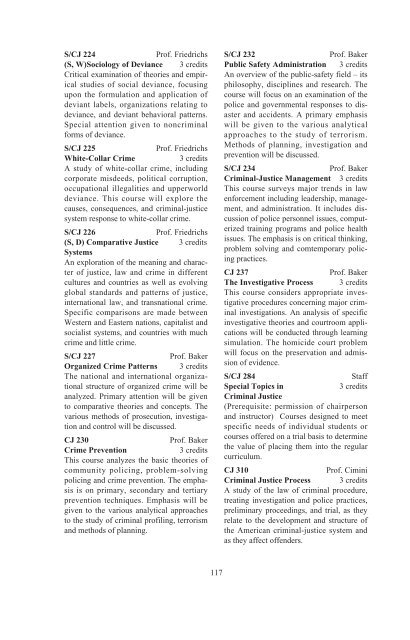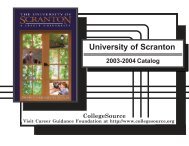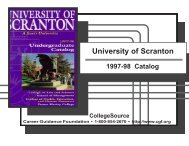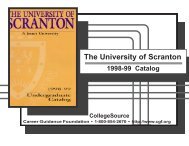2002-2003 - The University of Scranton
2002-2003 - The University of Scranton
2002-2003 - The University of Scranton
You also want an ePaper? Increase the reach of your titles
YUMPU automatically turns print PDFs into web optimized ePapers that Google loves.
S/CJ 224 Pr<strong>of</strong>. Friedrichs<br />
(S, W)Sociology <strong>of</strong> Deviance 3 credits<br />
Critical examination <strong>of</strong> theories and empirical<br />
studies <strong>of</strong> social deviance, focusing<br />
upon the formulation and application <strong>of</strong><br />
deviant labels, organizations relating to<br />
deviance, and deviant behavioral patterns.<br />
Special attention given to noncriminal<br />
forms <strong>of</strong> deviance.<br />
S/CJ 225 Pr<strong>of</strong>. Friedrichs<br />
White-Collar Crime 3 credits<br />
A study <strong>of</strong> white-collar crime, including<br />
corporate misdeeds, political corruption,<br />
occupational illegalities and upperworld<br />
deviance. This course will explore the<br />
causes, consequences, and criminal-justice<br />
system response to white-collar crime.<br />
S/CJ 226 Pr<strong>of</strong>. Friedrichs<br />
(S, D) Comparative Justice 3 credits<br />
Systems<br />
An exploration <strong>of</strong> the meaning and character<br />
<strong>of</strong> justice, law and crime in different<br />
cultures and countries as well as evolving<br />
global standards and patterns <strong>of</strong> justice,<br />
international law, and transnational crime.<br />
Specific comparisons are made between<br />
Western and Eastern nations, capitalist and<br />
socialist systems, and countries with much<br />
crime and little crime.<br />
S/CJ 227 Pr<strong>of</strong>. Baker<br />
Organized Crime Patterns 3 credits<br />
<strong>The</strong> national and international organizational<br />
structure <strong>of</strong> organized crime will be<br />
analyzed. Primary attention will be given<br />
to comparative theories and concepts. <strong>The</strong><br />
various methods <strong>of</strong> prosecution, investigation<br />
and control will be discussed.<br />
CJ 230 Pr<strong>of</strong>. Baker<br />
Crime Prevention 3 credits<br />
This course analyzes the basic theories <strong>of</strong><br />
community policing, problem-solving<br />
policing and crime prevention. <strong>The</strong> emphasis<br />
is on primary, secondary and tertiary<br />
prevention techniques. Emphasis will be<br />
given to the various analytical approaches<br />
to the study <strong>of</strong> criminal pr<strong>of</strong>iling, terrorism<br />
and methods <strong>of</strong> planning.<br />
117<br />
S/CJ 232 Pr<strong>of</strong>. Baker<br />
Public Safety Administration 3 credits<br />
An overview <strong>of</strong> the public-safety field – its<br />
philosophy, disciplines and research. <strong>The</strong><br />
course will focus on an examination <strong>of</strong> the<br />
police and governmental responses to disaster<br />
and accidents. A primary emphasis<br />
will be given to the various analytical<br />
approaches to the study <strong>of</strong> terrorism.<br />
Methods <strong>of</strong> planning, investigation and<br />
prevention will be discussed.<br />
S/CJ 234 Pr<strong>of</strong>. Baker<br />
Criminal-Justice Management 3 credits<br />
This course surveys major trends in law<br />
enforcement including leadership, management,<br />
and administration. It includes discussion<br />
<strong>of</strong> police personnel issues, computerized<br />
training programs and police health<br />
issues. <strong>The</strong> emphasis is on critical thinking,<br />
problem solving and comtemporary policing<br />
practices.<br />
CJ 237 Pr<strong>of</strong>. Baker<br />
<strong>The</strong> Investigative Process 3 credits<br />
This course considers appropriate investigative<br />
procedures concerning major criminal<br />
investigations. An analysis <strong>of</strong> specific<br />
investigative theories and courtroom applications<br />
will be conducted through learning<br />
simulation. <strong>The</strong> homicide court problem<br />
will focus on the preservation and admission<br />
<strong>of</strong> evidence.<br />
S/CJ 284 Staff<br />
Special Topics in 3 credits<br />
Criminal Justice<br />
(Prerequisite: permission <strong>of</strong> chairperson<br />
and instructor) Courses designed to meet<br />
specific needs <strong>of</strong> individual students or<br />
courses <strong>of</strong>fered on a trial basis to determine<br />
the value <strong>of</strong> placing them into the regular<br />
curriculum.<br />
CJ 310 Pr<strong>of</strong>. Cimini<br />
Criminal Justice Process 3 credits<br />
A study <strong>of</strong> the law <strong>of</strong> criminal procedure,<br />
treating investigation and police practices,<br />
preliminary proceedings, and trial, as they<br />
relate to the development and structure <strong>of</strong><br />
the American criminal-justice system and<br />
as they affect <strong>of</strong>fenders.
















